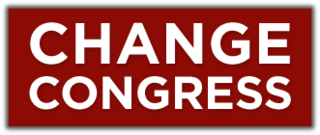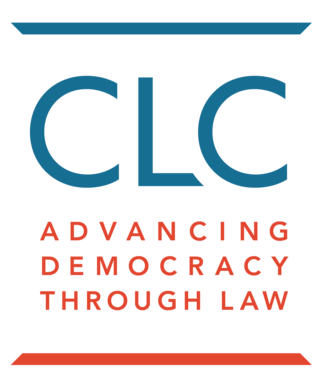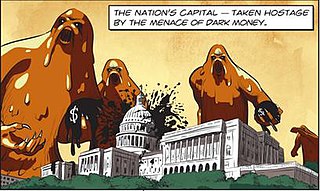Campaign finance laws in the United States have been a contentious political issue since the early days of the union. The most recent major federal law affecting campaign finance was the Bipartisan Campaign Reform Act (BCRA) of 2002, also known as "McCain-Feingold". Key provisions of the law prohibited unregulated contributions to national political parties and limited the use of corporate and union money to fund ads discussing political issues within 60 days of a general election or 30 days of a primary election; However, provisions of BCRA limiting corporate and union expenditures for issue advertising were overturned by the Supreme Court in Federal Election Commission v. Wisconsin Right to Life.
In the United States, a political action committee (PAC) is a tax-exempt 527 organization that pools campaign contributions from members and donates those funds to campaigns for or against candidates, ballot initiatives, or legislation. The legal term PAC was created in pursuit of campaign finance reform in the United States. Democracies of other countries use different terms for the units of campaign spending or spending on political competition. At the U.S. federal level, an organization becomes a PAC when it receives or spends more than $1,000 for the purpose of influencing a federal election, and registers with the Federal Election Commission (FEC), according to the Federal Election Campaign Act as amended by the Bipartisan Campaign Reform Act of 2002. At the state level, an organization becomes a PAC according to the state's election laws.

Campaign finance, also known as election finance, political donations or political finance, refers to the funds raised to promote candidates, political parties, or policy initiatives and referendums. Donors and recipients include individuals, corporations, political parties, and charitable organizations.

The Bipartisan Campaign Reform Act of 2002, commonly known as the McCain–Feingold Act or BCRA, is a United States federal law that amended the Federal Election Campaign Act of 1971, which regulates the financing of political campaigns. Its chief sponsors were senators Russ Feingold (D-WI) and John McCain (R-AZ). The law became effective on 6 November 2002, and the new legal limits became effective on January 1, 2003.
The Federal Election Campaign Act of 1971 is the primary United States federal law regulating political campaign fundraising and spending. The law originally focused on creating limits for campaign spending on communication media, adding additional penalties to the criminal code for election law violations, and imposing disclosure requirements for federal political campaigns. The Act was signed into law by President Richard Nixon on February 7, 1972.
McConnell v. Federal Election Commission, 540 U.S. 93 (2003), is a case in which the United States Supreme Court upheld the constitutionality of most of the Bipartisan Campaign Reform Act (BCRA), often referred to as the McCain–Feingold Act.
A publicly funded election is an election funded with money collected through income tax donations or taxes as opposed to private or corporate funded campaigns. It is a policy initially instituted after Nixon for candidates to opt into publicly funded presidential campaigns via optional donations from tax returns. It is an attempt to move toward a one voice, one vote democracy, and remove undue corporate and private entity dominance.

The United States Chamber of Commerce (USCC) is a business association advocacy group. It is the largest lobbying group in the United States. The group was founded in April 1912 out of local chambers of commerce at the urging of President William Howard Taft and his Secretary of Commerce and Labor Charles Nagel. It was Taft's belief that the "government needed to deal with a group that could speak with authority for the interests of business."

The financing of electoral campaigns in the United States happens at the federal, state, and local levels by contributions from individuals, corporations, political action committees, and sometimes the government. Campaign spending has risen steadily at least since 1990. For example, a candidate who won an election to the House of Representatives in 1990 spent on average $407,600, while the winner in 2022 spent on average $2.79 million; in the Senate, average spending for winning candidates went from $3.87 million to $26.53 million.
Electoral reform in the United States refers to efforts to change American elections and the electoral system used in the United States.

Change Congress was a project aiming to end corruption in the United States Congress by reducing what it considered the distorted influence of money in that legislative body. Founded in 2008 by Lawrence Lessig and Joe Trippi, Change Congress aimed to organize citizens to support political candidates who do not take contributions from PACs and lobbyists, oppose earmarks, support public financing of campaigns, and support more transparency in Congress.
Citizens United v. Federal Election Commission, 558 U.S. 310 (2010), is a landmark decision of the Supreme Court of the United States regarding campaign finance laws and free speech under the First Amendment to the U.S. Constitution. The court held 5–4 that the freedom of speech clause of the First Amendment prohibits the government from restricting independent expenditures for political campaigns by corporations, nonprofit organizations, labor unions, and other associations.
The Democracy Is Strengthened by Casting Light on Spending in Elections Act, or DISCLOSE Act, is a federal campaign finance reform bill that has been introduced in the United States Congress since 2010. The bill would amend the Federal Election Campaign Act of 1971 to provide for greater and faster public disclosure of campaign spending and to combat the use of so-called "dark money" in U.S. elections.

Campaign Legal Center (CLC) is a nonprofit 501(c)(3) government watchdog group in the United States. CLC supports strong enforcement of United States campaign finance laws. Trevor Potter, former Republican chairman of the Federal Election Commission, is CLC's founding president.

In politics, particularly the politics of the United States, dark money refers to spending to influence elections, public policy, and political discourse, where the source of the money is not disclosed to the public.

Mayday PAC is an American crowd-funded non-partisan Super PAC created by Harvard Law School professor and activist Lawrence Lessig. Its purpose is to help elect candidates to the Congress to pass campaign finance reform. It is notable for raising large sums from numerous contributors in a short span of time – nearly $11 million in 2014 – and was described in the Los Angeles Times as the "super PAC to end all super PACs." The group spent over $10 million in the November 2014 elections, but its strategic plan of electing candidates friendly to campaign finance reform failed.

The American Anti-Corruption Act (AACA), sometimes shortened to Anti-Corruption Act, is a piece of model legislation designed to limit the influence of money in American politics by overhauling lobbying, transparency, and campaign finance laws. It was crafted in 2011 "by former Federal Election Commission chairman Trevor Potter in consultation with dozens of strategists, democracy reform leaders and constitutional attorneys from across the political spectrum," and is supported by reform organizations such as Represent.Us, which advocate for the passage of local, state, and federal laws modeled after the AACA. It is designed to limit or outlaw practices perceived to be major contributors to political corruption.

The 2016 presidential campaign of Lawrence Lessig, a law professor at Harvard University and cofounder of Creative Commons, was formally announced on September 6, 2015, as Lessig confirmed his intentions to run for the Democratic Party's nomination for President of the United States in 2016. Lessig had promised to run if his exploratory committee raised $1 million by Labor Day, which it accomplished one day early. He described his candidacy as a referendum on campaign finance reform and electoral reform legislation.
A campaign finance reform amendment refers to any proposed amendment to the United States Constitution to authorize greater restrictions on spending related to political speech, and to overturn Supreme Court rulings which have narrowed such laws under the First Amendment. Several amendments have been filed since Citizens United v. Federal Election Commission and the Occupy movement.

The Freedom to Vote Act, introduced as H.R. 1, is a bill in the United States Congress intended to expand voting rights, change campaign finance laws to reduce the influence of money in politics, ban partisan gerrymandering, and create new ethics rules for federal officeholders.










